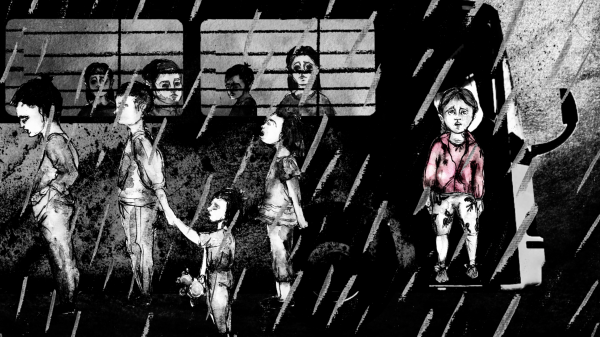Opera Feature: Should We Be Updating Operas So They Address Present-Day Issues?
By Ralph P. Locke
Philip Glass’s librettist Arthur Yorinks offers his thoughts on whether and how to update an opera as the Boston Lyric Opera releases its revamped and filmed version of The Fall of the House of Usher.
On Friday, January 29, Boston Lyric Opera launches a highly novel experiment. It will release for streaming to the public its brand-new video version of The Fall of the House of Usher, a short opera with music by Philip Glass, to a libretto by Arthur Yorinks. (The opera, based on the famous 1839 tale by Edgar Allan Poe, was first performed in 1988 at the American Repertory Theater in Cambridge, MA.)
Tickets for BLO’s streamed version are $10, or free if you become a subscriber to the BLO’s site operabox.tv. (Presumably several people can watch the opera together for the price of a single ticket.)
As I explain in a separate article, the BLO production is novel in two major ways:
- The singers and instrumentalists recorded their parts separately, to a click track, in order to remain COVID-safe. The conductor was actually in London!
- And BLO’s creative team has provided visual illustrations and stop-action animation that embed the opera’s plot in a wraparound modern story: Poe’s characters and their doings now become the fantasies of a young immigrant girl in detention on the US-Mexico border.

A scene from BLO’s filmed version of The Fall of the House of Usher. Luna arrives at Detention Facility. Photo: BLO
You can get a sense of the approach from this one-minute trailer that BLO just released:
I am fascinated by BLO’s bold initiatives and specific solutions.
Still, in recent years, like other operagoers, I have experienced (and at times outright hated) some extreme reworkings of operas from longer ago by, say, Mozart or Bellini.
I have often wondered: how would the work’s original creative team (librettist, composer, choreographer, etc.) have felt about their work being altered so drastically?
I’ve also wondered whether we should care what those long-dead individuals would have said. After all, BLO’s version of Usher is clearly trying to help us think about an important current sociopolitical issue: the North and Central American immigration crisis and, more generally, the anti-immigrant (and anti-Latinx) policies of the US government in recent years, and the nativist sentiments that have fueled those policies. Isn’t that more important than respecting the integrity or purity of an artwork? Or should I even say “a mere artwork”?
Of course we can’t ask Mozart or his librettist Lorenzo da Ponte, say, how they would feel about having The Marriage of Figaro take place, not in 1700s Seville, but in Manhattan’s Trump Tower. (This particular reassignment was carried out in the late 1980s in a famous production directed by Peter Sellars. A video of it is available in part or whole on YouTube and other sites. In November 2016, after Trump was elected president, Sellars, in the New York Times, reminisced about his original intent in that production and its surprising, or perhaps unsurprising, later resonances.)
These kinds of issues are being debated a lot nowadays, for example in this hour-long roundtable about the “harmful and problematic” aspects of canonic operas. The event was organized by Philadelphia Opera and entitled “Re-Envisioning the Opera Canon.” The panelists are Melissa Dunphy, Michael Mohammed, Emily Sung, and Tanyaradzwa Tawengwa, with host Veronica Chapman-Smith.
But to makers of opera who are still very much alive and active we can pose such questions.
So I asked Arthur Yorinks, since he was the librettist for The Fall of the House of Usher back in 1988, how he feels about the upcoming BLO production. After all, their version focuses not just on Poe’s mysterious semihaunted mansion and its somewhat unappetizing denizens nearly 200 years ago but also on something that neither he nor Glass could originally have dreamt of: the plight of one vulnerable young refugee in the year 2021. (I invited Philip Glass to respond as well, likewise through the BLO, but without success.)
Here are my questions and librettist Yorinks’s thoughtful answers: flexible in some ways, firm in others. I should stress that Yorinks is a well-known author of radio dramas and children’s books. He has collaborated with such renowned figures as Tom Stoppard and Maurice Sendak. Throughout his career he has no doubt thought long and hard about what is particularly effective in one medium rather than another (radio, say, versus theater or a physical book). His richly informative website gives further context to the highly articulate replies that he offers below.

Librettist Arthur Yorinks. Photo: courtesy of the BLO.
Ralph Locke: To what extent were you consulted by BLO about their plans for re-envisioning the
opera?
Arthur Yorinks: I was not aware of the production until only recently and did not know of their plans in advance.
Locke: How do you feel about such “strong”/interventionist productions of existing operas, in general?
Yorinks: Well, of course it depends on the production. But, in general I applaud those who would like to take the work (the opera) in directions of their own accord, as long as the original work is respected in its content (music and libretto). Is there a boundary line? Yes, if the opera itself is so warped in its intent (in a certain production), then it seems to me why present the opera to begin with — go and create a new one. If you’re framing a painting and all one sees is the frame, then perhaps you’re on the wrong track. Same with directing an opera or play.
Locke: How do you feel about this one?
Yorinks: It would be grossly unfair for me to comment on a work that has not yet been presented. And that should not be interpreted that I have negative feelings about it. Come back to me in a month and I can give you my “review.” Without commenting on the work itself, I’m terrifically glad people are attempting to figure out how to present opera during these challenging times.
Locke: Would you welcome fresh (such as this) treatments of other opera works in which you were involved, such as The Juniper Tree [which likewise has music by Glass]?
Yorinks: It sounds like I’m equivocating here, but again it all depends on what those treatments are, what the productions are.
Locke: There is an obvious disparity in many such interventionist productions (whether live or filmed/streamed) between a free treatment of the visual elements (action, costumes, sets, added projections…) and the near-complete preservation of the sung words and music. Would you accept/encourage alterations of the latter as well, in the interests of making a work more relevant to modern-day viewers?
Yorinks: To be direct and clear, in any production, there should not be a musical note, nor a word changed in any production unless approved by the creators of the original work. There are reasons for each choice made by the composer and the librettist, and yes, I do feel strongly about that point. For example, in The Fall of the House of Usher, my libretto is decisively and deliberately concise – and the narrative activities during stretches of music are specifically spelled out. How one conveys that narrative is up to a director, but the underlying work should not be altered. This may seem too confining, but if you’re playing a Mozart concerto, you don’t have the liberty to add notes or delete them, in my opinion. You can interpret those notes, and that interpretation is within the artistry, the province of the musician. If a work is worthy, it doesn’t need to be “made more relevant” — which of course does not mean it can’t be set in a different time period or framed in a way that can enlighten modern audiences. Dare I say do we need to modernize Shakespeare’s language to understand it (no, surely, I’m not comparing my libretto to Shakespeare)? Granted, I fall into the category of believing in a faithful rendering, a faithful adaptation if you will, if you are presenting or adapting (from one medium to another) an underlying work. As I stated earlier, why be involved in a work you don’t trust or respect. But there’s room for invention; to allow an audience to see a work in a way they might not have expected or experienced before, which only happens in the truest sense if the work is “uncovered” – and not buried (excusing the possible pun).
Yorinks speaks for himself, but the film’s trailer speaks powerfully for itself as well. This is clearly a production that aims to make the opera “more relevant” (in Yorinks’s own words). Does the wraparound tale about the harshness of immigration enhance, or detract from, the opera’s mysterious story of doom and desire, madness and disease, in a crumbling mansion?
I encourage readers who are interested in the new directions that the genre of opera is taking nowadays to try Boston Lyric Opera’s production of Philip Glass and Arthur Yorinks’s The Fall of the House of Usher (when it begins streaming on Friday, January 29). (Click here to sign up for $10.) And let the rest of us know, in the Comment box below, what you think!
Ralph P. Locke is emeritus professor of musicology at the University of Rochester’s Eastman School of Music. Six of his articles have won the ASCAP-Deems Taylor Award for excellence in writing about music. His most recent two books are Musical Exoticism: Images and Reflections and Music and the Exotic from the Renaissance to Mozart (both Cambridge University Press). Both are now available in paperback; the second, also as an e-book. Ralph Locke also contributes to American Record Guide and to the online arts-magazines New York Arts, Opera Today, and The Boston Musical Intelligencer. His articles have appeared in major scholarly journals, in Oxford Music Online (Grove Dictionary), and in the program books of major opera houses, e.g., Santa Fe (New Mexico), Wexford (Ireland), Glyndebourne, Covent Garden, and the Bavarian State Opera (Munich). A version of this review first appeared in American Record Guide and here appears by kind permission.
Tagged: Arthur Yorinks, Boston-Lyric-Opera, Philip Glass, Ralph P. Locke

If you want to write about the tribulations of th e 21st century immigration drama write your own opera about it if you have the talent. Don’t try to paste it on to someone else’s work on a different subject and in a different time frame. Demonstrate your talent by creating something original. Leave Mozart and Verdi alone.